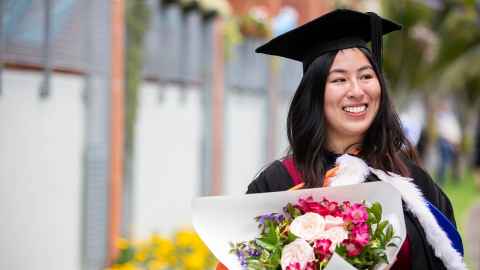Succeeding when pain won’t leave you alone
3 November 2020
There were times for student Lin Kee, when the idea of finishing her studies and graduating seemed unlikely, if not impossible.

This week the delighted twenty-five year old took part in the University of Auckland's Spring Graduation, receiving a BCom/BSc conjoint degree, despite the painful struggle it has taken for her to get here.
Soon after starting University, Lin began getting debilitating pain in her wrists and hands. The condition kept deteriorating and eventually she could only write for 20 minutes at a time.
Initially diagnosed with Carpal Tunnel Syndrome, she was re-diagnosed with Repetitive Strain Injury when the pain and loss of sensation began travelling up her right arm and neck.
She was reluctant to visit the Equity Office's Student Disability Services, believing her injury wasn’t “good enough” to qualify as a disability, even though she was struggling to keep up with her coursework.
She was reluctant to visit the Equity Office's Student Disability Services, believing her injury wasn’t “good enough” to qualify as a disability, even though she was struggling to keep up with her coursework.
Now she feels she owes her degree to their support. “I wish I’d gone to see them sooner. My physical condition was having a huge impact on my mental condition. It’s very difficult to concentrate if you are in pain, and I was in pain a lot of the time,” says Lin.
Her condition kept changing and Student Disability Services (SDS) arranged for her to have a note-taker, which she says made a huge difference.
“I had a lot of anxiety, but SDS was there with me every step of the way and they never questioned the issues with my health. They arranged extra time for me in tests, and as my injury became more aggravated, a computer for exams, as well as assistance applying for aegrotat and compassionate considerations.”
Now based in Wellington where she is employed in a two-year graduate programme run by Govtechtalent, Lin has finally been diagnosed with a condition called Complex Regional Pain Syndrome. It’s a disorder of the nervous system associated with previous injury, leaving your brain registering pain and responding with a host of symptoms.
Looking back, Lin says she is so thankful for all the support she received from SDS. She ultimately plans to work in the area of cyberpsychology, a developing field that looks at the impact of technology on our cognitive processes and actions.
As part of her graduate programme, she has just started her second placement at ACC as a technical business analyst, following a stint at Statistics NZ, where she had the opportunity to assist with Covid-19 response-related work.
"It’s been a long journey to get here, one I couldn’t have done alone. I owe my degree to the immense support I received from the University's Health Services, Equity Office and loved ones," says Lin.
Media queries
Miranda Playfair | Media adviser
Mob 021 063 8393
Email m.playfair@auckland.ac.nz